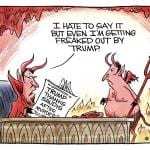There is a moment on the TV show Timeless, in the episode “Mrs. Sherlock Holmes,” in which the presidency of Donald Trump is mentioned:
Rufus Carlin : Hey, who’s president?
Denise Christopher : Donald Trump. Was that not supposed to happen?
Lucy Preston : I don’t know, but it wasn’t us.
I’ve been talking about time travel in my class on Religion and Science Fiction this semester, and also thinking about it as I’ve made revisions to the manuscript of my forthcoming book in the Black Archive series. There is a section that reflected something I often think about in relation to this topic and consider important, but which didn’t really fit as a discussion of the episode “The Battle of Ranskoor av Kolos.” And so I cut it. One advantage of having a blog is that the things we need to cut do not need to be completely discarded. Some will be and deserve to be, of course. But it actually makes it easier to remove a thought that doesn’t work in a particular context knowing that, if nothing else, it can be a blog post. Here’s what I wrote:
The ethical implications of certain assertions about history, time travel, and changing the ‘past’ are often glossed over. If time travel is possible, then our current moment is the past from the perspective of some would-be tamperers from the future. If we think of any particular horrific atrocity that unfolded somewhere on Earth in our lifetime, what would it mean for the Doctor or any other time traveler to show up and call it a ‘fixed point in history’? Was seeking to prevent it at the time it was happening pointless? Was trying to prevent it perhaps even in some sense ‘unethical’ with respect to the ethics of history and time travel, if not those of violence and respect for human life? It does not really work to say that something only becomes a ‘fixed point in history’ once it happens, since for time travel to that moment to be possible from the future and the past, it must exist in some universe and timeline as a constant accessible to time travelers. Of course, perhaps with the implications this view has for free will, the implications for ethics and activism on behalf of justice may seem like minor concerns. But time travel stories—including ones that jump ahead thousands of years as The Battle of Ranskoor of Kolos does—cannot avoid these issues entirely. These and all the other ethical issues we have raised remain at the end of the episode. The Battle of Ranskoor of Kolos provides a good basis for discussing them, without in any sense resolving them.
Does the year 2020 show that time travel isn’t possible, since someone would undoubtedly have come to try to fix things? Or is this one of those fixed points the tampering with which is impossible without worse catastrophe ensuing? Or could it be that, like saving the life of Edith Keeler in the Star Trek episode “City on the Edge of Forever,” with hindsight it would be worse in the long run to go back and make things better?
Lest you miss it, this has definite theological implications. Many reject the idea that God might allow evil for a greater good. I have problems with that argument myself, just to be clear. But if, seeing the consequences of McCoy saving Keeler, it was right for Kirk to prevent him from doing so and allow her to die, doesn’t that have implications for theodicy? Wouldn’t a God that could see the future United Federation of Planets and valued it be right to allow the evils that get humanity and other species there?
On the third episode of the current season of Star Trek: Discovery, we see another scenario involving time travel, this time from the past to the future. As one review points out, the episode is speaking directly to our historical moment, so much so that it could easily be renamed “Make Earth Great Again.” It addresses isolationism and the demonization of enemies so that we cannot perceive their humanity behind the mask they wear. An arrival from the future could not simply shift us in the direction of a brighter future. (I loved that the music turns dark just at the moment Capt. Saru talks about making this future the crew of Discovery finds itself in bright.) Conversely, sometimes a reminder from the past is needed to make us rediscover values that we strove to embrace and implement and which, in a time of difficulty, we have set aside.
It is my hope that from the realities of the present day a better future will emerge as those of us committed to justice, equity, and inclusivity recognize that we cannot simply take for granted that the arc of history bends towards justice. We must be actively involved in bending it, not through force of arms and hate which are inevitably self-defeating in relation to this purpose, but through the even greater forces of love and hope.
Finally, always relevant to the subject of time travel and trying to make the past better is the SMBC cartoon about someone who went back in time to kill Hartler:













